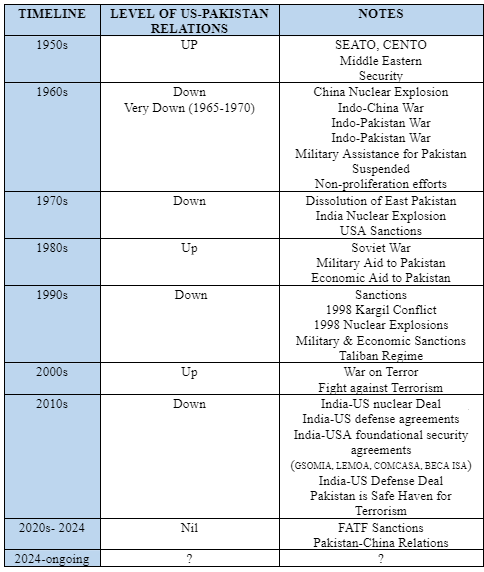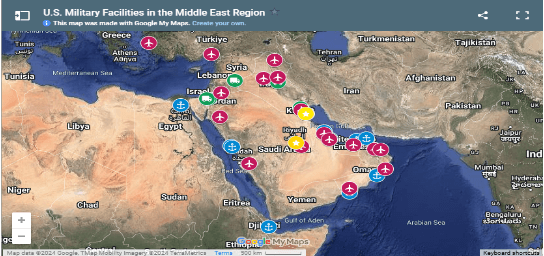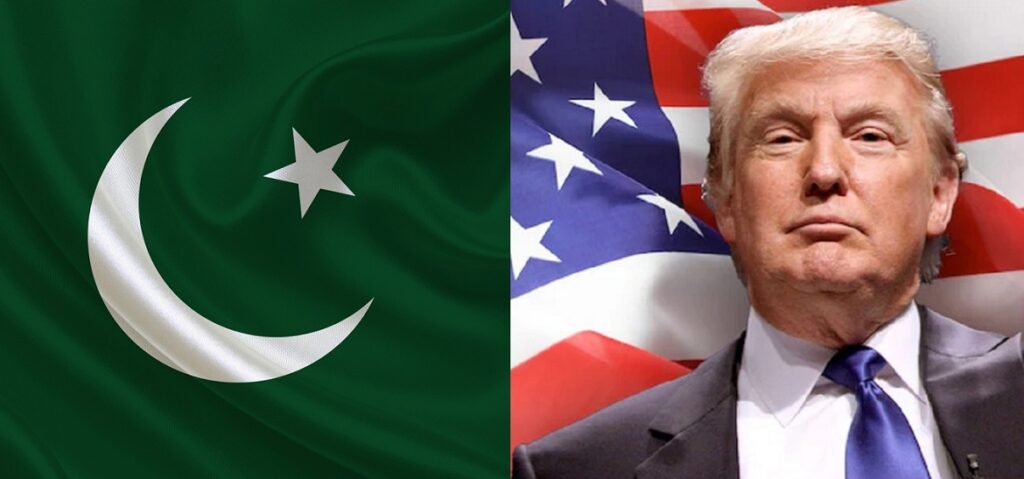“In international Relations, the cure relations are super important but the National Interests are supreme. In this multipolar world, States should avoid putting all eggs in one basket because dependency on one basket could be fatal. This advice is particular for developing nations.” Dr. Rana Danish Nisar
This is the first time in the history of the elections of the United States, President Trump has won from all seven swing states (Arizona, Georgia, Michigan, Nevada, North Carolina, Pennsylvania and Wisconsin) of the United States of America.

Prior to elections, Trump was seen as the winning candidate in the sittings of international pundits, international relations discussions, political science observers, foreign policy pundits and in the media forums. In fact, this time Trump’s policies are clear and refined. Without any ambiguities, Trump shows his agenda and manifesto of his four years tenure as president.
During his campaigns, he shows his notion of global peace. Historically, as compared to republicans, mostly history has witnessed that democrat is the war party. Woodrow Wilson, Franklin D. Roosevelt, Harry S. Truman, John F. Kennedy & Lyndon B. Johnson, Jimmy Carter were all the Republican Party presidents and the peace of the globe was compromised during their tenures as president from “World War I to soviet war 1979 including World War II, Korean war, and Vietnam war respectively.
Apart from his previous tenure, now president trump has well known knowledge about global politics and how to run global politics in the digital era or artificial intelligence era. He came to know that the dynamics of world politics have been changed and the ancient policies, foreign policies measures are not appropriate in these contemporary digital international relations.
As mentioned above, the president trump has very clear vision particular about his foreign policy priorities, international relations, national interests, alliance, USA combat commands i.e., USAFRICOM, USCENTCOM, USCYBERCOM, USEUCOM, USINDOPACOM, USNORTHCOM, USSOUTHCOM, USSPACECOM, USSOCOM, USSTRATCOM and USTRANSCOM.
This is the first time in the history of the elections of the United States, President Trump has won from all seven swing states (Arizona, Georgia, Michigan, Nevada, North Carolina, Pennsylvania and Wisconsin) of the United States of America.
Prior to elections, Trump was seen as the winning candidate in the sittings of international pundits, international relations discussions, political science observers, foreign policy pundits and in the media forums. In fact, this time Trump’s policies are clear and refined. Without any ambiguities, Trump shows his agenda and manifesto of his four years tenure as president.
During his campaigns, he shows his notion of global peace. Historically, as compared to republicans, mostly history has witnessed that democrat is the war party. Woodrow Wilson, Franklin D. Roosevelt, Harry S. Truman, John F. Kennedy & Lyndon B. Johnson, Jimmy Carter were all the Republican Party presidents and the peace of the globe was compromised during their tenures as president from “World War I to soviet war 1979 including World War II, Korean war, and Vietnam war respectively.
Apart from his previous tenure, now president trump has well known knowledge about global politics and how to run global politics in the digital era or artificial intelligence era. He came to know that the dynamics of world politics have been changed and the ancient policies, foreign policies measures are not appropriate in these contemporary digital international relations.
As mentioned above, the president trump has very clear vision particular about his foreign policy priorities, international relations, national interests, alliance, USA combat commands i.e., USAFRICOM, USCENTCOM, USCYBERCOM, USEUCOM, USINDOPACOM, USNORTHCOM, USSOUTHCOM, USSPACECOM, USSOCOM, USSTRATCOM and USTRANSCOM.
As the head of the world’s politics stakeholder, this time Trump has more responsibilities because the world is facing two major conflicts: the Russian-Ukrainian war and the Israel-Palestine conflict which could be catastrophic for world peace or could be called the inauguration of World War III.
Moreover, the rise of China, active appearances in the Indo-pacific region, South China Sea conflict, Taiwan issue and most importantly arms modernization and artificial intelligence influence of China are also the “Pandora’s Box” for the pentagon. The nuclear North Korea and its offensive moves are creating tensions for Trump’s foreign policy agenda settings as like as his previous tenure. Iranian & Israel skirmishes, Middle Eastern instability, rise of terrorism and extremist organizations are or will be the new alarming challenges for the white house in the next 4 years.
The international relations pundits argue that the trump administration and pentagon priorities are to maintain the American “Status quo” in global politics but the challenge is that in the current multipolar setup of this world politics, it seems difficult or can’t continue. The rise of the importance of “BRICS & SCO” are challenging the American national interests in wider Asia and South America as well. The massive investments of China in Africa, the economic assistance to African countries, build up strategic military bases in Djibouti, infrastructure planning in Africa, huge investment (131 million $) in Iran is calling the alarming situation for the pentagon in the context of China and its speedy influence in the world. Apart from the Chinese rise, India is also seeming paradoxical while dealing with the USA in the alliance system of Asia. The contemporary foreign relations of the USA need a rapid transformation for the American global “status quo”.
By following the theme of the present piece of study, the USA and Pakistan relationship is always seeming paradoxical in nature while discussing both states in the line of history. Since the times of yore, Pakistan has always been a tactical ally in the US foreign policy not only in the Cold war era but also in post-cold war episodes. From the “SEATO” & “CENTO” security agreements to “War on Terror”, International relations analysts argue that Pakistan’s role in the pentagon strategies are not more than “time pass’’ and nothing else.
During the cold war, the USA needed a partner in wider Asia against the USSR and defending its national interests. The major reason behind the USA inclination with Pakistan was the Indian NAM policy and in-depth predisposition with the USSR. But the USA romance with Pakistan was declined when the USA suspended the military aid to Pakistan during the Indo-Pakistan wars 1965, 1971 which reciprocally gave the white spread sentiments for Pakistan. But soon after the 1971 tragedy, the Nixon’s administration needed Pakistan’s support with the aim to build a reliable relation with China. The “Ping Pong” diplomacy and Pakistan’s crucial role was acknowledged by the Nixon’s and Pentagon administration. In the year of 1974, the “Smiling Buddha” & Indian crown of nuclear power reciprocally turned the balanced south Asia into an imbalance and shocked the international community regarding their failed nuclear non-proliferation efforts.
President Ford and later Jimmy Carter forced the Pakistan’s administration under Z. Bhutto set up possible contingency non-nuclear moves in south Asia and placed Pakistan in sanctions. The below chart shows the ups and down relationship timeline of Pakistan-USA relations.

After the soviet invasion in 1979, the importance of Pakistan was seen supreme again. The unprecedented military, economic and arms support from the USA to Pakistan was admirable. After the disintegration of the USSR and the inauguration of world order, the inclination of the USA was moved from Pakistan to India.
Owing to the largest economy, the rising economy, the liberal economy, the strategic importance, arms modernizations, the biggest market for export of weapons, near to South East Asia, near to Sea lanes of communications (SLOC) and importantly connected to Indian Ocean, India got importance in the lap of the pentagon in the post-cold war era. After the decade of disintegration of the USSR, the 9/11 incident once again shifted the dynamics of the global as well as regional politics and the US foreign policies priorities were finding new allies for the safety of the dignity, status quo, national interests of the USA.
Apart from the swear consequences and socio-economic, political impacts on Pakistan, the role of Pakistan in WOT was admirable. The relationship between Washington & Islamabad during the previous trump era was harsh but not harsher. Trump’s juxtaposition with Modi from “Howdy, Modi” to “Namaste Trump”, 3 billion $ defense deal, and Trump cited Pakistan as “safe haven for terrorism” forced the Islamabad to search for truth.
The winning celebrations by Trump and Indian diaspora in the USA gives green signals to India that this time again the Indo-US relations will most probably drive upward. With the early steps, trump has appointed Vivek Ramaswamy as Commissioner of the Department of Government Efficiency.On the contrary, Islamabad should rethink this reality. There are some predictive developments that could happen in the coming years in the bi-relations (Pakistan-USA) particularly, triangular relations (USA-Pakistan-India) and the rectangular relations (USA-China-India-Pakistan).
After signing the Abraham Accords and rising Arabs-Israel juxtaposition mounting economic, trade, technology and political understanding among them, there will be pressure on Pakistan’s foreign policy makers to think seriously about it (Abraham Accords). Economic instability is the crucial issue of Pakistan and the IMF relations with the developing countries are interests based. It seems possible that the relations between Pakistan and IMF could be bitter. Additionally, the “pandora box” of FATF could be opened again. The Israel-USA-India triangular strong romance could be challenging for the Pakistan-China ties, Pakistan-Russian romance and Pakistan-China-Russia-Turkey nexus in the geopolitics context.
The proverb “new wine in an old wineskin” could be true in the context of India-US relationship because India is a compulsion for the USA in the wider Asia or Indo-Pacific region. It seems possible that Trump will restore the long-waited alliances with the aim to restore its influence and power politics in the region. The “Indo-Pacific strategy, QUAD, AUKUS, Blue Dot Network” will be restored and it will have direct or indirect impacts on Pakistan’s geopolitical, Geoeconomics position in the region or global forums.
India will be but surely not Pakistan the best option for the USA while dealing with USA combat commands, USCENTCOM & USINDOPACOM. The strategic importance of India and very near connection to the Indian Ocean pushes the pentagon to give special treatment to India. Everyone knows in international relations discipline that “there is no permanent enemy or friend in international relations but the national interests are important” and the main reason behind the India-US inclination is rising China and its rise in the Indo-Pacific region.
The belt & road initiative (BRI) and CPEC could be the challenging contest for the new elected president and Pakistan is the crucial member of these two entities. Reciprocally, Pakistan could face challenges in the USA-Pakistan relations in the context of the Iran-Israel conflict. It might be possible that owing to Pakistan’s resting or isolation policy on ongoing Iran-Israel conflict, the new administration of white House reuses the words of Bush “with us or against us”.
In the matter of rising China, the Trump administration will be thoughtful but on the contrary China is now a serious and mature regional as well as global stakeholder. Beijing administration will definitely avoid any direct or indirect, minor or major, high or low skirmish with Washington because Beijing knows very well about the consequences of any conflict. Since 9/11, the terrorism is still the hour of tension for the globe and it seems that the Whitehouse will not have any soft corner or compensation on this issue of terrorism. The Trump administration will adopt a very strict policy against vis-à-vis terrorism.
The harsh truth is that after the US withdrawal from Afghanistan, the importance of Pakistan is decreasing and even there has been no official visit of any high authorities of the USA or pentagon to Pakistan in the last four years. On the contrary, the acrimonious veracity is that the long-lasting India-USA strategic partnership could be turned into new varieties or domains of relationships between two democracies that could augment Indian power either offensive or domination in southern Asia and beyond. The southern Asian smaller states’ security could be at risk including and particularly Pakistan.
The last four years of Pakistan-US relations are in the error line. As mentioned above, the Biden administration didn’t even bother Pakistan in his four years of presidency. According to contingency perspective, The USA main priorities and the areas of discussions on the desk of pentagon are “Rising China”, “Israeli support over Israel-Palestine issue”, “Ukraine-Russia”, “North Korean issue”, “Taiwan Issue”, “South China Sea”, “Indo-Pacific”, “Alliances” recognitions, “Asian-NATO”, “Abraham accord as Middle eastern Quad”, Transformation from “Quad to Digital-Quad” but Pakistan would not be enlisted in the main priorities list of the USA under the Trump administration until or unless the USA interests force to rethink about the importance of Pakistan in the region because the founder of the modern American foreign policy Henry Kissinger once said that “America has no permanent friends or enemies, only interests”.
Moving forward, international politics is not going to change and its truth. It will always be selfish, self-worth, interests based, and focused on national interests. The realistic School of thoughts inks that national interests and survival are primary goals of the states rather than the enemies or friends.
The states should be more powerful because in the time of need or when you dial the 911 number, no one will attend the call or will be ready to help you. Pakistan should know this reality. By following history, Pakistan should scale down its expectations while dealing internationally or regionally. Domestically, Pakistan should rapidly reframe its policies i.e., economic, trade and political as well. Internationally, Pakistan’s foreign policy should be focused and contingent.
The policy makers should avoid the International or regional game of “Tom & Jerry” and planned policy should be adopted. It’s not easy to put all the eggs (dependency) in the basket of the west but to maintain relationships with the west, particularly with the USA should be the priority of Pakistan. The reason for this is that the west has a massive contribution in all international entities i.e., World Bank, IMF, WHO and UNO as well and Pakistan needs these all entities. Even so, the USA’s funding to the UNO is about 3 billion $ and the European Union’s funding to the UN is almost 20 billion euros.
The influence and the hegemony of the USA’s funding in the IMF and World Bank is about 17.67%. so, Pakistan should actively know about these realities that government machinery is running with the IMF’s juxtaposition. With regional context, we can’t change the neighbors but by following the smooth regional political, security, economic and trade relations, the mistrust level can be decreased.
The relationship with immediate neighbors Iran, Afghanistan and eastern border countries should be practical and realistic because there is no lap or shoulders for “emotions” in international politics. While dealing with the major global stakeholders i.e., USA, China, Russia, European Union, and Japan as well, Pakistan needs balanced but pragmatic relations. Pakistan should avoid any bloc or alliance politics because Pakistan can’t afford it. Pakistan should avoid indulging directly or indirectly as a third party in any regional or international conflict because Pakistan’s economic conditions and political unstable fabrics are miserable. Moving towards Gulf states, the USA has in-depth influence in the middle eastern region and the figure 2 shows the USA total military installations in the middle eastern region.
Figure: U.S. military installations in Middle Eastern Region (Source: ASP)

Sooner or later, it might be possible that the powerful appearance of the USA in middle east and ongoing Israel-Palestine as well as Iranian-Israel reciprocal missiles attacks on each other could be fatal and being an immediate neighbor, Pakistan will have serious impacts as like as the USA appearance in Afghanistan and long headed Afghan war after 9/11.
Finally, the foreign policy or foreign relations of Pakistan should be very clear and refined in their goals and expected outputs. The notion is simple that if Pakistan cannot afford an American’s warm hug, Pakistan should not suffer its hate. The reciprocal high expectations of both states should be avoided and the relationships midst both states should be patted within the positive engagement manners.
Author: Rana Danish Nisar – Independent international analyst of security, defense, military, contemporary warfare and digital-international relations.
(The views expressed in this article belong only to the author and do not necessarily reflect the views of World Geostrategic Insights).







